Discover the quirks of some of McMaster’s oldest and newest buildings
When McMaster’s Hamilton campus first opened its doors in 1930, it consisted of five buildings: University Hall, Hamilton Hall, Wallingford Hall, Edwards Hall, and the Refectory. These buildings were designed in the Collegiate Gothic style and inspired by universities such as Oxford and Cambridge.
The ornamental stonework featured on University Hall and Hamilton Hall is typical of the Gothic architectural style. These two buildings were designed by architect William Lyon Somerville. The carvings above the University Hall Arch (pictured) depict students wearing graduation caps.
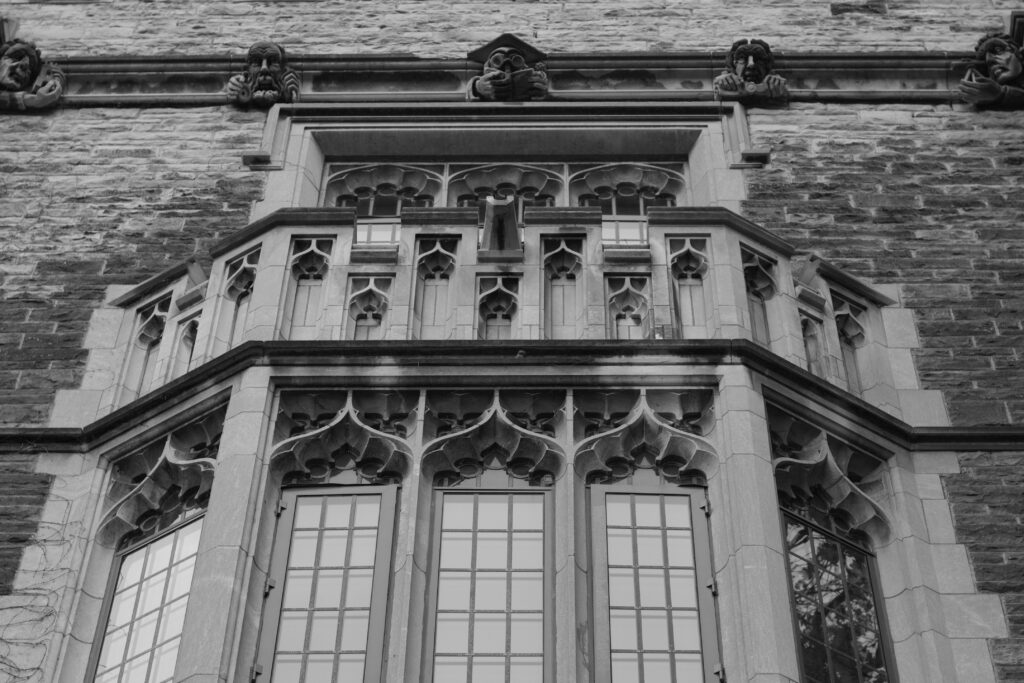
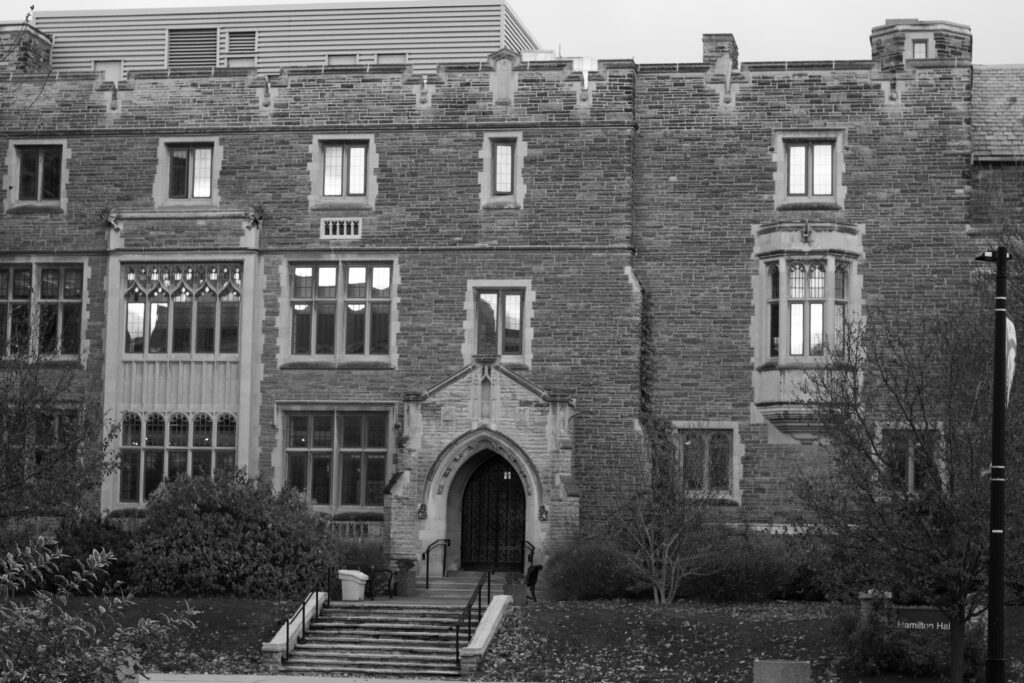
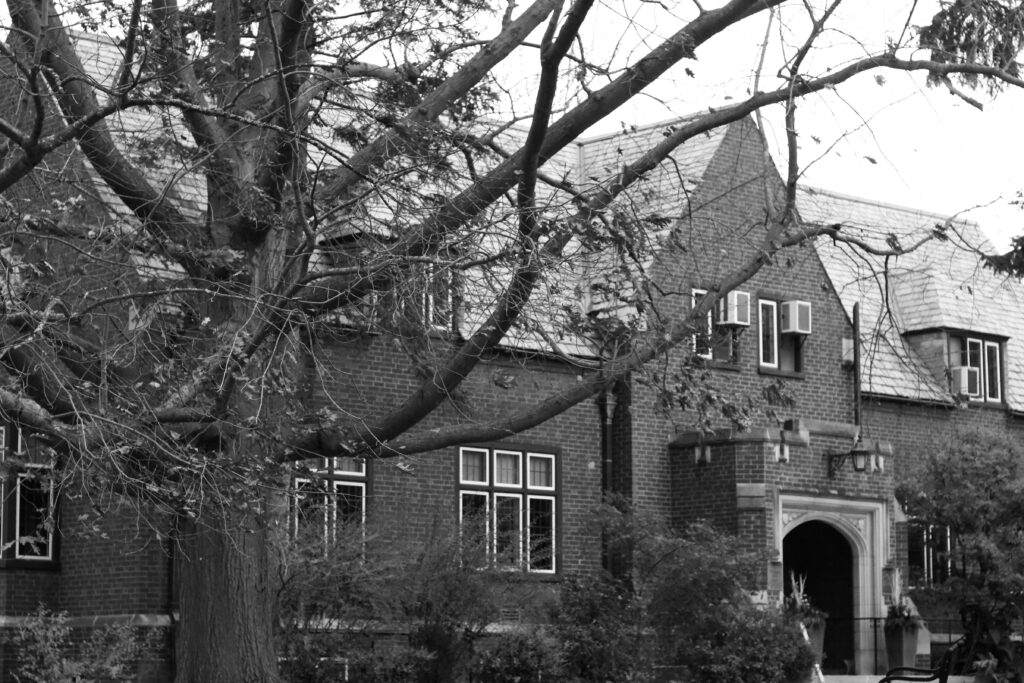
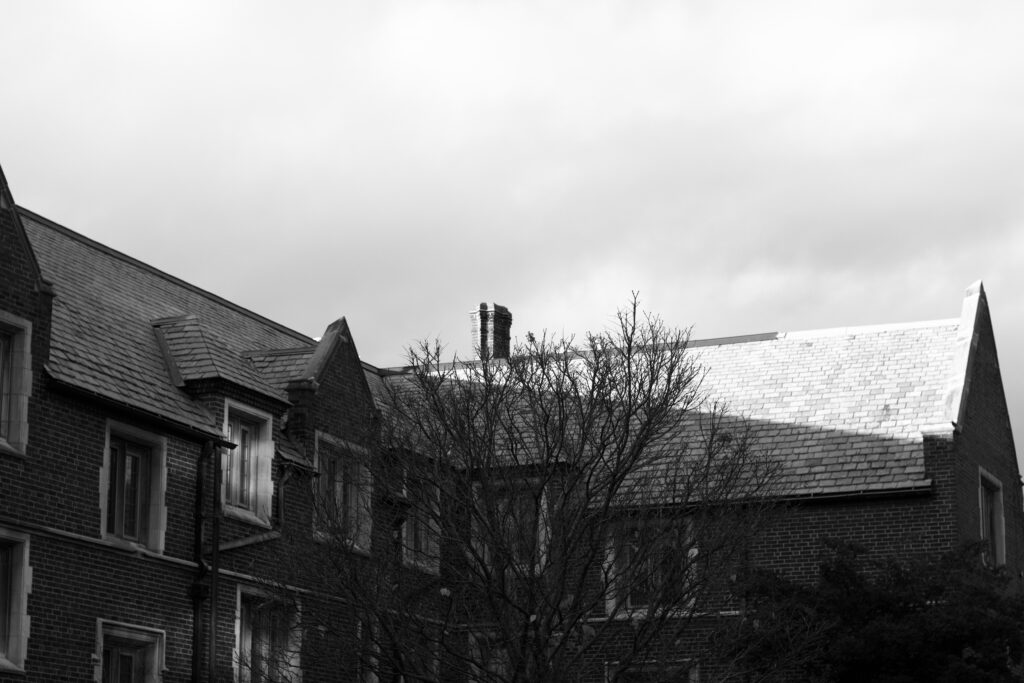
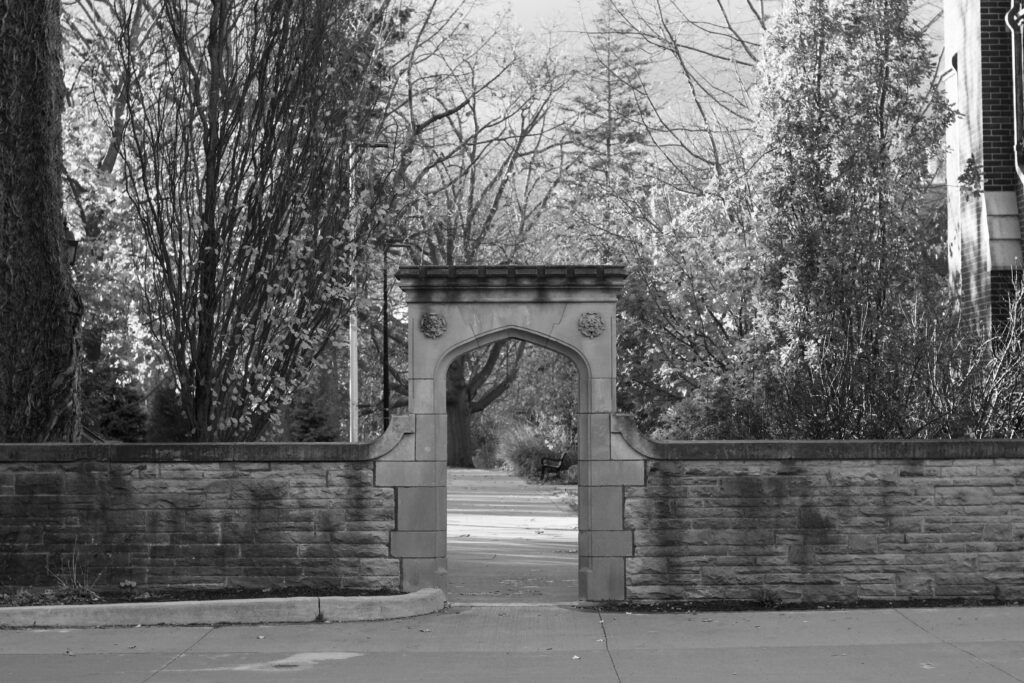
The McMaster Health Sciences Centre was designed by architect Eberhart Zeigler, with the intention of “never being finished.” The interior of the building was designed without the need for structural support walls, allowing for future modification.
This building was designed in the Brutalist architecture style that emerged in the mid-1900s and first opened in 1972.
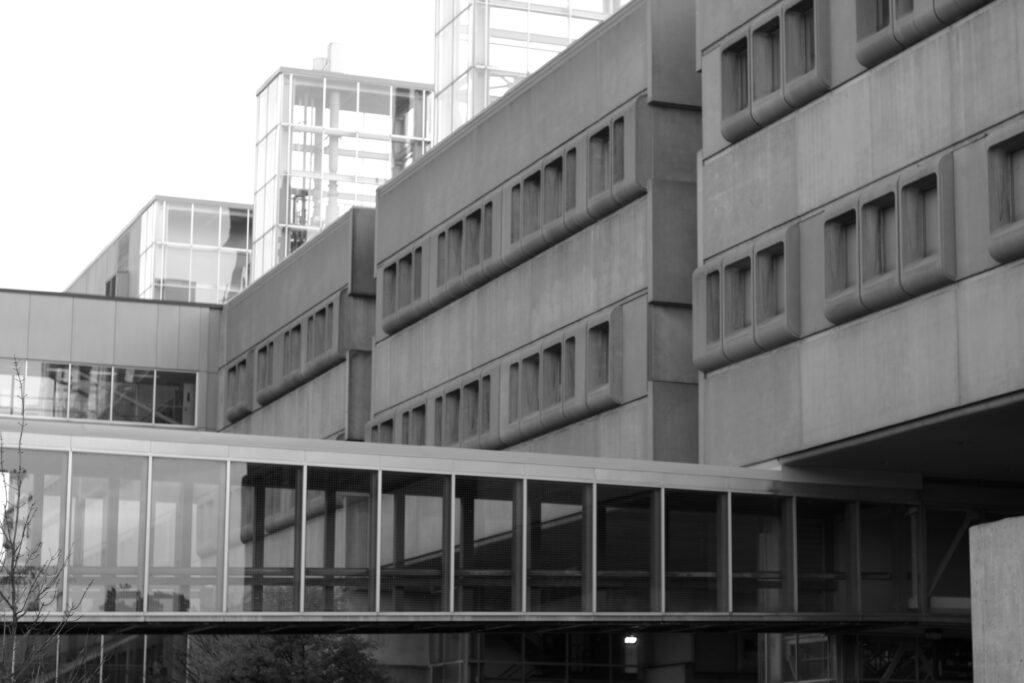
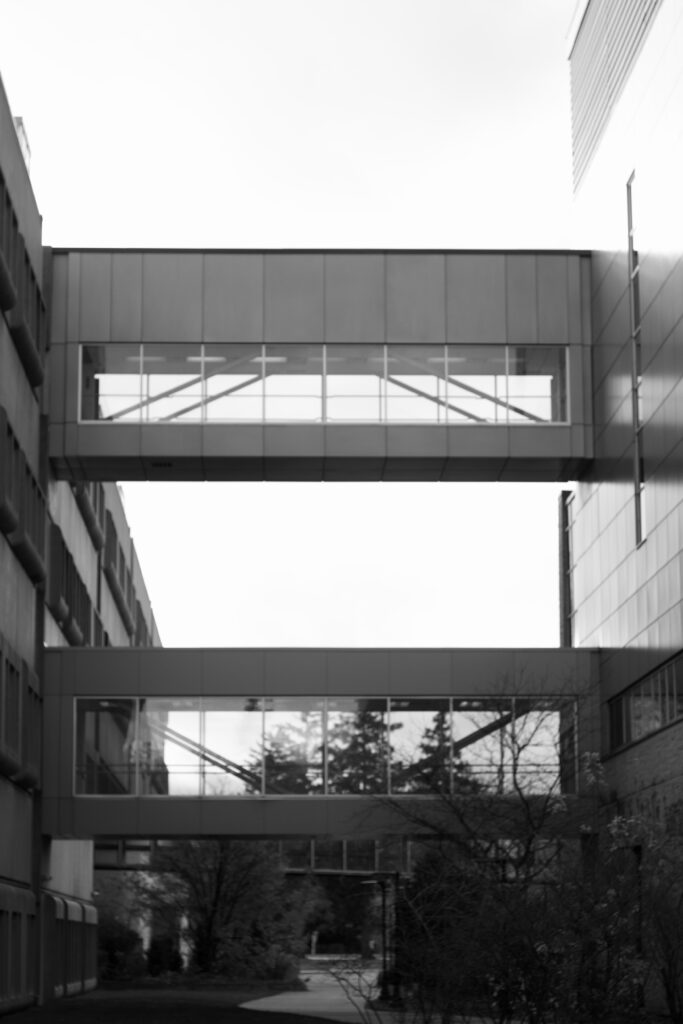
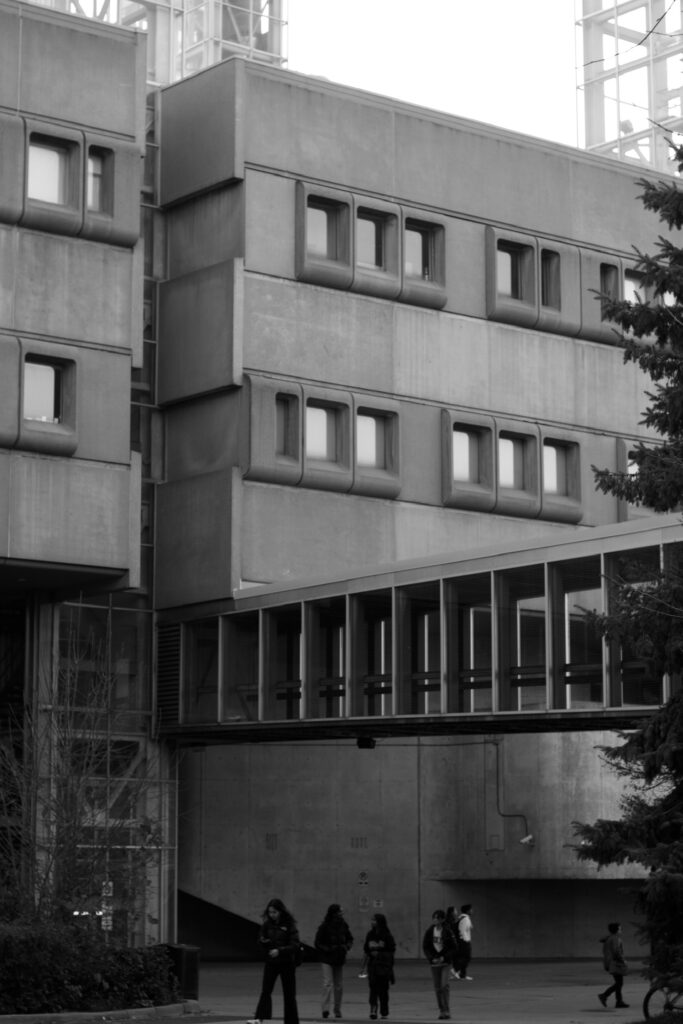
Among McMaster’s newest buildings are The Hub (2024), the Peter George Centre for Living and Learning (2019), and L. R. Wilson Hall (2017). L. R. Wilson Hall features a concert hall, blackbox theatre, interactive classrooms and an inner courtyard (pictured). The Peter George Centre was designed by architecture firm Diamond Schmitt. The four-storey atrium is naturally lit by a skylight and features a spiral staircase.
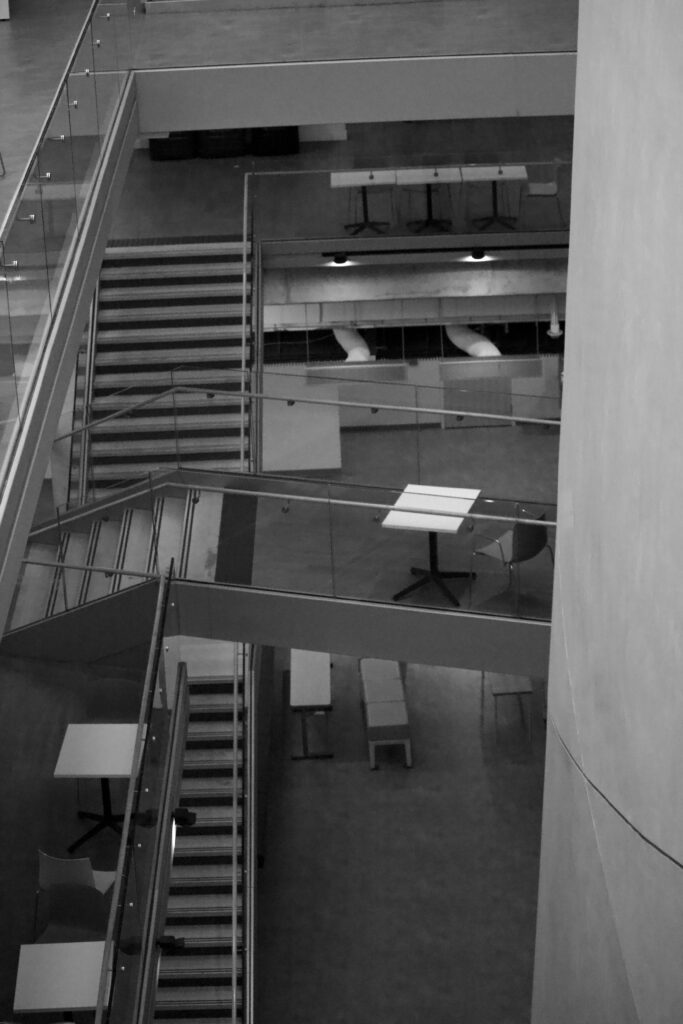
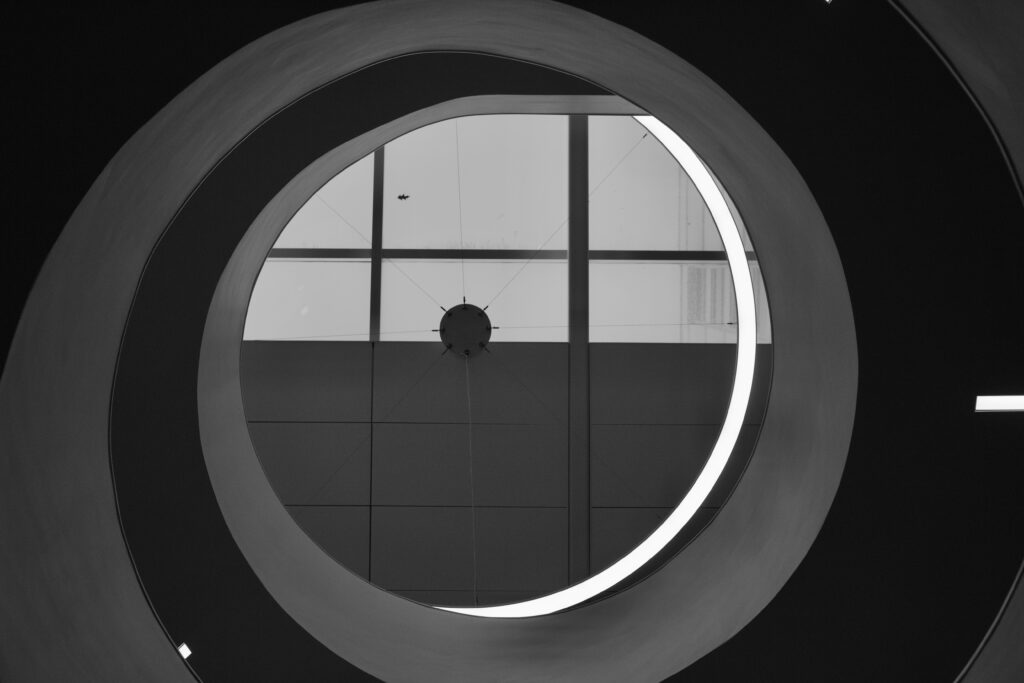
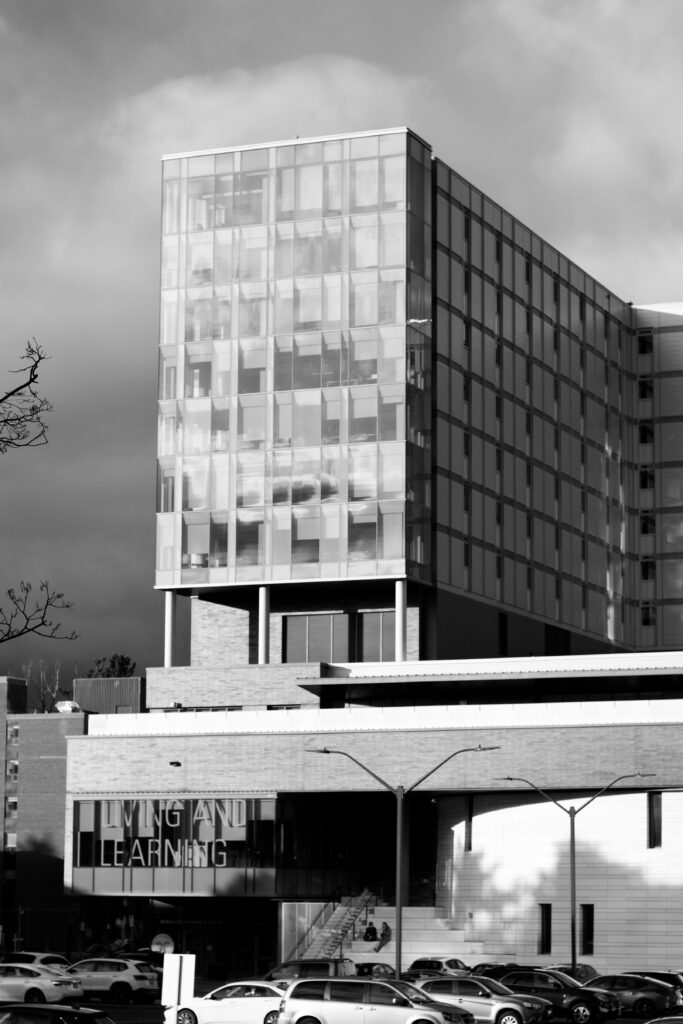
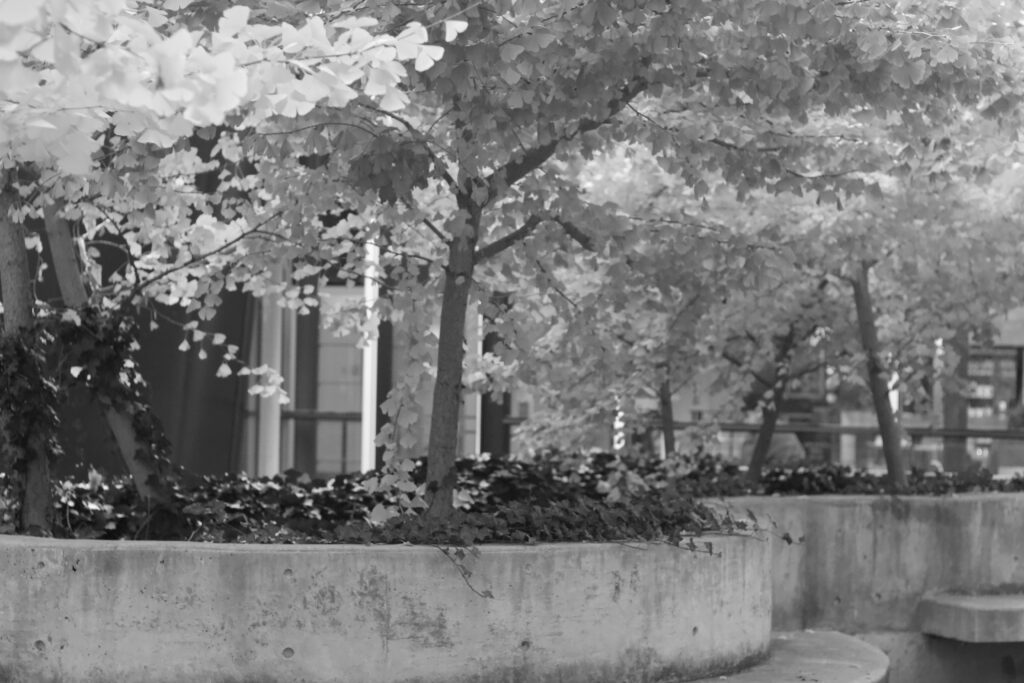
Although campus offers accessibility options, there are still many improvements needed to be made to create a more inclusive space for all
Most university students have experienced the discomfort of some of the older lecture halls on campus; choosing between either your notebook or laptop, as only one can fit on the tiny stowaway table, is every lecture’s struggle.
Now imagine this struggle for a person who already faces challenges on a day-to-day basis. The disappointment they feel when they finally reach the lecture hall after a long wait for the elevator, just to realize there is nowhere they can comfortably adjust their wheelchair without drawing the attention of the entire lecture hall.
As McMaster continues to strive for a more inclusive environment, we need to remember to consider the needs of those members who have difficulty accessing basic places such as lecture halls and study areas.
When we take one step into this discussion, we will discover that it is quite broad as disabilities present themselves in many ways, some that are not even visible to the eye. They can be, and are not limited to, physical or cognitive. It may seem overwhelming that every disability is unique and has its own needs, so it is important that we effectively implement solutions for each specific one.
Providing this specific community with support and helping them receive the quality of education everyone deserves will help them continue to be comfortable in their own skin.
I think it is also bare minimum to simply include all communities when creating establishments that will stand for decades, especially respected one’s where individuals from all around the world come to learn.
It is crucial that we begin this reform now so that this community does not feel discouraged to pursue their studies. It is natural to feel detached to something when it is not being taken seriously by others.
When students begin to observe the efforts being made to alleviate the challenges that individuals with disabilities face, it plants the seed for discussion surrounding this topic. Young students have active minds and fresh perspectives which makes them great innovators.
Adjusting campus to suit the needs of students who have a disability is immensely important so that they can receive the same post-secondary experience that their peers do as well as aiding in dissolving the pre-existing stigmas of a wide variety of disabilities.
This is all not to say that change is not being implemented as we speak.
“MacChangers is an interdisciplinary program led by the faculty of engineering at McMaster to encourage students from all backgrounds to collaborate on community engagement programs within the greater Hamilton area”, says Haniya Rahman, an active member of the organization.
“MacChangers is an interdisciplinary program led by the faculty of engineering at McMaster to encourage students from all backgrounds to collaborate on community engagement programs within the greater Hamilton area”
Haniya Rahman, MacChangers Member
MacChangers frequently partakes in brainstorming ways to implement accessibility resources and customizes them to the lecture halls of McMaster. The initiative encourages its participants to think outside the box in order to help their peers.
As students at this university, taking part in extracurriculars like MacChangers can help emphasize the importance of customizing areas of our campus so that it suits the needs of everyone who makes use of it.
Making campus more accessible ultimately benefits every one of its students in the end, whether they face a disability or not. When an establishment makes it a point to include every sub-community that they house, it shows a united front.
This not only attracts potential students to choose that university over another, but it also creates a more welcoming and comfortable environment for their current students in which they can prosper and as a result, become notable alumni.
It is important that not only we educate ourselves more on the different accessibility options provided for individuals with a disability, but also learn how to make it all more accessible.
It is important that not only we educate ourselves more on the different accessibility options provided for individuals with a disability, but also learn how to make it all more accessible.
If it's encouraging more eyes on buildings that need renovations to be more accessible, or simply taking the stairs when the elevator is full, we can all be doing something small to make even a slight difference.
It is important that every student’s needs are met, regardless of how unique they can be to the individual.
After a fire in Bates Residence, a McMaster student was charged with arson-disregard for human life
On Jan. 28 at around 2:00 p.m., a small fire broke out at McMaster University's Bates Residence in a third-floor apartment.
The fire was contained to one suite, but the entire building was evacuated as a precaution. No injuries have been reported, and the building was able to safely reopen only a few hours later.
The fire was contained to one suite, but the entire building was evacuated as a precaution. No injuries have been reported, and the building was able to safely reopen only a few hours later.
Amarah Hasham-Steele, News Editor
“On scene, police and partners located the unit on fire, which was extinguished, and no injuries were suffered,” said Hamilton Police Services, in a media release, issued on Jan. 29.
While the fire was contained within the four-bedroom suite in which it started, three nearby rooms also suffered smoke and water damage, forcing their occupants to temporarily relocate. A total of eight students were impacted by the fire.
While the fire was contained within the four-bedroom suite in which it started, three nearby rooms also suffered smoke and water damage, forcing their occupants to temporarily relocate. A total of eight students were impacted by the fire.
Amarah Hasham-Steele, News Editor
HPS stated in their release that 20-year-old Ruomu Ba had been charged with arson — disregard for human life.
The HPS release also asked members of the public to contact Detective Sergeant Lockley by calling 905-546-3833, if they have any information about the case.
McMaster University released two statements about the fire on Daily News. The first, released on Jan. 28, informed students of the fire and that it had been safely extinguished. The second, released on Jan. 29, informed students that charged had been laid.
C/O Travis Nguyen, Photo Editor
Second-years were able to experience their own Welcome Week after a year of online class
Often, when students think about the beginning of their university experience, they think about Welcome Week, a week dedicated to welcoming first-year students to campus. Welcome Week provides first-year students with the opportunity to meet new people and orient themselves around campus.
However, students who entered university in the year of 2020 faced a new reality to this monumental event. For the majority of those students, classmates were met virtually, through platforms such as Zoom. Though this had its own benefits, these students were not able to experience Welcome Week.
The missed occasion was not unnoticed by those who planned Welcome Week as McMaster University announced that these students who missed out would be able to join their classmates on Sept. 11, 2021.
Second-year undergraduate students were offered a Second-Year Welcome, where they can register for and attend a variety of events meant to capture community-building aspects of an in-person Welcome Week.
In the morning, students can discover the student services provided by McMaster, then have a few hours to meet peers within their faculty and make friends at different MSU events. These events seem to very simply condense what would have happened over a week into a day.
“We want to give you the in-person welcome we couldn’t give you at Welcome Week 2020,” the Student Success Centre said in their announcement.
Jacquie Hampshire and Rachel Nelson were two of the staff members of the SSC who helped ensure that Second-Year Welcome unfolds accordingly. They stated that given how last year's welcome week had panned out, this year's welcome was in the making for over a year.
“When we had learned that last year was going to be a virtual welcome week, at that time the welcome week advisory committee alongside all of our partners on campus had committed to hosting an in-person event when it was safe to do so. So this has been, I would now say, well over a year in terms of thinking about this welcome, and waiting until we were safely able to welcome students to McMaster campus,” said Hampshire.
"When we had learned that last year was going to be a virtual welcome week, at that time the welcome week advisory committee alongside all of our partners on campus had committed to hosting an in-person event when it was safe to do so. So this has been, I would now say, well over a year in terms of thinking about this welcome, and waiting until we were safely able to welcome students to McMaster campus."
Jacquie Hampshire, staff member of the SSC
While discussing the meticulous planning that went into this event, Hampshire and Nelson explained the question that was on many second-year students’ minds: Why was a traditionally week-long event limited to a single day? When asked this question it was all down to one word: accessibility.
“We had considered all options when we were looking at the planning of this event to figure out what was going to be the best. We had landed on offering a one day event for a number of reasons. One is just logistically, for students that are living out of town to provide them the opportunity to be able to come to campus. Offering the event on multiple days doesn’t afford the quite same accessibility for students that may not be in close proximity to the campus. Looking at a one day format has allowed us to maximize the event and also be able to provide this event to all students,” said Hampshire.
They were also asked how exactly the entirety of the second-year population would be on campus while maintaining social distancing guidelines. Hampshire and Nelson quickly reassured that when sign-ups for events had 100 person limits on each and all events were guaranteed to be outside.
Alongside this, students were also required to use MacCheck to ensure they were allowed on campus. MacCheck is an app where McMaster students have to upload proof of vaccination and daily check-ins to ensure that no one is entering campus with COVID-19. With all these precautions put in place, it would maintain the guidelines that were instructed by the city of Hamilton.
As Vice-President of Student Affairs for the McMaster Science Society, Isabelle Son was in charge of ensuring that second-year science students would be able to socialize with their faculty peers during the event.
She was asked to summarize what she wanted Second-Year Welcome to achieve.
“It’s an opportunity for second years to meet each other, because they didn’t get the opportunity to have on-res experience or the in-person welcome experience last year. I know that’s where I met a lot of my friends, and how I met lots of people so this would be an opportunity for them to socialize with their peers and get a glimpse of what welcome week in-person would look like for them,” said Son.
With the large variety and possible popularity among some events, Son’s team had to plan how to ensure science events were all within guidelines.
“Our capacity for outside is 100 people. But we are splitting it up into three different stations and all three stations are in different areas on the Burke Science Building field. So each station can have 100 people. We will have 20 executives and/or representatives at each station so that means only 80 students can sign up for each station. Masks will be encouraged, all the executives and representatives will be wearing them. Within events, each person will be spaced out and put into smaller groups at each station. This is to encourage interacting with less people,” Son explained.
McMaster’s second-years have waited diligently for the idea of a proper welcome to the campus where they will be spending their years as a young adult. The Second-Year Welcome has given them the opportunity they had been waiting for.
On Monday Sept. 18, McMaster University announced that we will become a smoke-fee school. This is an incredible progression for the university in a number of ways, beyond the fact that McMaster will become a healthier campus for everyone.
According to the McMaster Daily News, McMaster will be ending the use of tobacco and any other smoking devices inside, outside and around campus.
This also includes the Ron Joyce Centre in Burlington and any other McMaster owned facilities.
By declaring the campus to become a tobacco and smoke free campus, McMaster is promoting the health and wellness of not only students, but McMaster faculty, staff and even guests.
This is an initiative that is meant to improve the daily lives and health of the McMaster community by ensuring that no one on campus will be exposed to second hand smoke. For a person who is allergic to smoke and nearly chokes at every encounter with it, this initiative will absolutely improve my McMaster experience.
Seeing as McMaster is recognized globally for being an institute that is committed to health advancements and student well being that is rising in global rankings, this will only increase our rankings as an internationally well-renowned institute.
One concern that arises with applying this new policy is that adjusting to such a change for those who do smoke might not be easily transitional.
However, the university has already anticipated possible responses to the change, and is planning accordingly.
“This change will have different implications for the diverse communities across our campus.”
Ryan Deshpande
Vice president (Education)
McMaster Students Union
To prepare for the change on campus, McMaster has claimed that there will be a comprehensive program available that will help the McMaster community adapt.
Another concern is maintaining respect for diverse groups who may practice the use of smoke and tobacco for cultural reasons.
Ryan Deshpande, vice president (Education), stated, “This change will have different implications for the diverse communities across our campus.”
As we all manage this transition, it is important that the University’s resources cater to the cultural and mental wellbeing of these communities, and that everyone is aware of these supports throughout this process,” he added.
In response to this concern, the university claims that it recognizes and understands that certain Indigenous cultures may have traditional and sacred needs for the use of tobacco for medicinal purposes, and assures that in certain cases, there can be exemptions granted to the policy if need be.
The university assures those concerned about the implementation and regulation of this change that it will not be an abrupt one.
The enforcement is meant to be phased into implementation for the first few months of the change.
In areas near campus but not on campus, the university claims that they will try to regulate the number of people who smoke in neighbouring residential streets and sidewalks so that there isn’t an increase in smoking there are a result.
In terms of regulation, if someone is violating the policy within the adjustment period, they’ll just be asked not to use the smoke or tobacco and directed to a cessation program.
The implementation and execution of a smoke free campus is one that will bring positive community response and global recognition that all students are able to benefit from.
Beyond the efforts that the university is taking with respect to our health and well being, this change will be an active stance in helping to improve the campus environment as well.
This change is something that we as McMaster students should be proud to be a part of moving into the future of the university.
[thesil_related_posts_sc]Related Posts[/thesil_related_posts_sc]
McMaster students can now find 50 all-genders washrooms on campus. As per definitions from McMaster’s Equity and Inclusion Office define, these bathrooms are free to use no matter one’s gender identity.
Most of the facilities have been placed in the Ann Bourns Building, the Michael DeGroote Centre for Learning and Discovery and the future Living Learning Centre set to open in 2019, but the majority of the university’s buildings now have at least one all-genders washroom.
“Being able to access safe and accessible washrooms is a human right; however, for campus members who identify as transgender, gender non-binary, two-spirit or who do not conform to strict gender expectations, washrooms are often unsafe places where they may be subjected to verbal and physical harassment,” read part of a statement from the Equity and Inclusion Office.
A second-year non-binary McMaster student who requested to be referred to under the alias of Jay echoed this sentiment.
“I think it is critical to have all-genders washrooms because there are students with non-binary identities, and these students will not feel comfortable in washrooms that are assigned exclusively for men or for women,” they said.
Trailing behind other Canadian universities, such as the University of Toronto, York University and Ryerson University, the decision to implement McMaster’s all-genders washrooms initiative was years in the making.
“I think it is critical to have all-genders washrooms because there are students with non-binary identities, and these students will not feel comfortable in washrooms that are assigned exclusively for men or for women.”
Jay
Non-binary McMaster Student
The university’s facilities update is, in part, a product of recent, pro-LGBT legislative changes such as Bill C-16, which included gender identity and gender expression in the list of hate crime sentencing provisions in the Canadian Criminal Code and prohibited grounds of discrimination under the Canadian Human Rights Act. Another more local policy change was the pro-trans rights protocol that Hamilton City Council passed in March 2017.
On campus, the shift for McMaster to adopt all-genders washrooms gained traction when Ehima Osazuwa, the McMaster Students Union President in 2015-2016, ran on a platform that showcased the importance of gender-neutral washrooms on campus.
[google_maps id="31737"]
With financial assistance from McMaster’s work/study program and project funding from the Equity and Inclusion Office and The President’s Advisory Committee on Building an Inclusive Community, trans, gender non-binary and agender students were hired to lead the all-genders washroom Project.
McMaster’s new washrooms are part of a multi-phased initiative aimed at improving trans inclusion on campus.
“[The] Equity and Inclusion Office will be launching an educational campaign for the broader campus community and on-line resource for trans, gender non-binary and Two-Spirit students, staff and faculty members,” said Vilma Rossi, the senior program manager of the Equity Services program at the university’s Equity and Inclusion Office.
“We’ve already started populating the site with information and will continue to do so over the next several weeks as we edit and confirm accuracy of information and contact person.”
As part of the initiative, the university also aspires to renovate the multi-stall bathrooms in the McMaster University Student Centre Atrium into new, multi-user, accessible all-genders washrooms.
“There really, I think, is no excuse for not having washrooms available for trans, non-binary, and Two-Spirit students… They should be expected from the university… Being able to change a sign is not a very difficult request,” said Jay.
[thesil_related_posts_sc]Related Posts[/thesil_related_posts_sc]
By: Pavle Arezina
I attended a talk from psychology professor Jordan Peterson on March 17, 2017 at McMaster. What I and others saw and experienced was shameful. It was a failure on the university security for doing nothing, a failure as a student body for not being able to listen to an opposing opinion without spouting vitriol and a failure on McMaster for condoning this behaviour.
Have we, as a respected university, come to a point where opinions deemed invasive to someone’s safe space must be stamped out immediately? This crusade led by the select few to destroy the ability to speak freely about certain topics that offend them is a dangerous trend that needs to be addressed at McMaster.
At the event, I saw more people convert to Peterson’s view on topics he has discussed because of the unethical behaviour shown by the protestors. There were many who only wanted to have an honest debate about the pros and cons of Jordan Peterson’s stance on Bill C-16 and other issues.
Through the barrage of hate sent by these vocal protestors, Peterson calmly spoke to the majority who strained to hear the message he was stating. Even more impressive was that he tried to start a dialogue with the protestors at the beginning of the lecture, despite the fact that the three professors planned for the panel dropped out due to pressure from this minority. The drone of slurs he received made it clear that he would be getting nowhere.
Protesting had the opposite effect of what they are trying to achieve. You think being screamed at and equated to a worthless human being will make me consider your opinion more valid than a person who is offering open discussion?
Where was the campus security to remove these people? The amount of people in the room alone should have caused them to eject anyone not in a seat due to the fire hazard. They did not want to appear discriminatory against a certain subset of people. They did not want to remove people who are clearly disrupting the event, clearly getting into Peterson’s face and presenting a safety hazard.
It seemed as though McMaster was scared of damaging their reputation, and was willing to risk the safety of their students instead of attempting to remove the protestors.
It is clear that there is a majority of students who wish to educate themselves and learn more on topics that interest them. The more open we are to considering ideas that are different, discussing the merits of them and debating in a civil manner, the better off as a university we are.
We have sacrificed our ability to critically think about issues in the name of not offending every group on campus.
As a society, imposing views on a group of people is never an answer to any issue we face. Instead, we should collectively come to a solution that addresses the issues we all face. Our neighbours to the south represent what can happen when you demonize a set of people on their beliefs instead of engaging in healthy debates.
I am not saying to approve anything anyone wants to preach about. People who incite violence towards groups or doesn’t follow the rules set forth by the university should clearly be denied access to a platform. We should not get rid of events and clubs that support and provide a place of safety for those marginalized.
All we can do is take a long hard look at the state of free speech at our campus and ask whether more can be done to protect it.
By: Saad Ejaz and Hetal Patel
It may be difficult to imagine, but there are all sorts of creative alternatives out there to help create a more sustainable campus.
Typical discussions about sustainability tend to talk less about how to conserve water in our lawn maintenance endeavours. Although there is not much thought given to water use in this context, highlighting issues like these can be a solid first step in developing a respectful attitude towards water use and decreasing wasteful activities.
As Canadians, we are privileged enough to have access to one fifth of the world’s surface freshwater. However, we are not always mindful in our use of this scarce resource. If we continue to contribute to the upward trends of wasteful water usage, we may fall victim to water scarcity at home.
One of the greatest water- consuming activities we engage in is maintaining our gardens and lawns. On average, traditional grass lawn size of 0.18 acres needs an estimated 40 to 70 litres per day to water. McMaster’s total landscape area, taken care of by the grounds staff, is 300 acres. This means that we use roughly more than 100,000 litres.
A traditional green lawn serves the purposes of recreational use and aesthetic value. However, what if we considered an alternative that could serve those same purposes while using less water?
The costs of traditional grass lawn mowing and maintenance can range from $214 to $322 on average for 0.18 acres. Imagine the amount of money McMaster spends on lawn maintenance for over 300 acres of grass.
A substitute for traditional grass lawns are clovers, which have become a popular alternative due to the benefits that they present. This is largely due to clover being inexpensive, easy to grow and requires little attention and maintenance.
Currently, the cost of a traditional grass lawn is estimated between $8 to $12 for 4,000 square feet. This may not seem like much, however it is quite expensive when we compare it to the cost of having clover. It costs approximately $4 to plant clover over an area of four thousand square feet. Why not opt for the cheaper alternative and save money?
While it does require initial watering, the clover lawn requires little to no additional water once established. This would allow us save hundreds of liters of water that would otherwise be consumed for the same purpose.
Another important point to consider is that each year we spend hundreds of dollars on grass lawn maintenance. We can reduce this cost through the use of clovers since they are nitrogen fixing plants that enrich the soil with natural fertilizer. In addition to not needing chemical fertilizers, clover also stays green in the driest part of the summer without the need for water.
As much as we may enjoy mowing our lawns on a John Deere lawn tractor, clover does not require any mowing maintenance. The costs of traditional grass lawn mowing and maintenance can range from $214 to $322 on average for 0.18 acres. Imagine the amount of money McMaster spends on lawn maintenance for over 300 acres of grass.
Looking at it from an environmental perspective, there would be a lower release in greenhouse emissions due to less use of machines that mow the grass. Not to mention the amount of money we would be saving on gasoline, the purchase of a lawn mower and the maintenance of the mower. These are massive costs that we can save at McMaster, and we can use that money towards other sustainable development practices.
In each of the past three months, at least one racially charged event has made local headlines, from the ‘alt-right’ posters in November to the swastikas spray painted onto the escarpment Rail Trail earlier in February. With that said, student groups on campus have made it their prerogative to combat harmful rhetoric through research, consultations and education.
On Feb. 22, the McMaster Equity and Inclusion Office published a report called “Challenging Islamophobia on Campus Initiative Report”. Written in response to the violent backlash against Muslims following the 2015 Paris attacks, this report outlines the research carried out by the office and their recommendations from their findings.
“The backlash created a climate of fear within the Canadian Muslim community including here at McMaster,” said Raihanna Hirji-Khalfan and Khadijeh Rakie,the staff members tasked with the initiative, alongside the release of the report.
Through roundtable discussions with Muslim students and faculty, the report found Islamophobia exists on campus and intersects with other identities and poses a unique experience for racialized students on campus.The report noted jokes equating Islam to terrorism, discomfort surrounding the portrayals of Muslims in media and the silencing of voices when speaking against Islamophobia as some key issues.
The report also discussed the unique experience of Black Muslims on campus.
“During the roundtable discussion, a Black, visibly Muslim student shared that following deadly attacks attributed to Muslims and Islam there was an expectation for her to speak up in class and denounce the attacks,” the report noted.
The report recommended creating better resources for marginalized students as a way to limit the percolation of Islamophobia on campus, as well as recognizing the threat of Islamophobia. It made note of the Islamophobia they received while conducting their research, particularly from professors emeriti who circulated a newsletter denying the existence of Islamophobia while the researchers ran workshops.
The report also discussed the need for institutional mechanisms to address Islamophobia on campus. The report argued for the implementation of clear punitive measures in the face of hate crimes in order to create a safer campus.
 Many groups on campus have echoed the points made by the report in their past work. The McMaster Womanists, in collaboration with the McMaster Indigenous Student Community Alliance, McMaster Muslims for Justice and Peace and Solidarity For Palestinian Rights (McMaster) held an anti-racism action initiative in November.
Many groups on campus have echoed the points made by the report in their past work. The McMaster Womanists, in collaboration with the McMaster Indigenous Student Community Alliance, McMaster Muslims for Justice and Peace and Solidarity For Palestinian Rights (McMaster) held an anti-racism action initiative in November.
This meeting asked students and Hamiltonians to discuss what steps the community should take in order to combat racism both on campus and within the city.
The meeting’s executive summary made many points, most notably arguing for more accountability of those who commit hate crimes and allowing marginalized groups to participate in decision making to ensure their voices and concerns are heard.
Other activist groups are currently working to bring injustices to light, such as the aforementioned MMJP. MMJP is currently advocating on behalf of the deceased Soleiman Faqiri, a Muslim man with well-documented schizophrenia, who died in police custody under suspicious circumstances. They have created a campaign called #JusticeforSoli, and ask the public to not only ask questions about the suspicious death but also question the treatment of racialized individuals and those with mental illness within the prison system. Their work has created a dialogue around his death and has been discussed in other media outlets such as CHCH.
While their work has received positive attention, student activists are often met with safety concerns, from having their personal information shared to receiving death threats.
Lina Assi, a Palestinian student activist, has had her information shared online without her consent and regularly receives death threats in response to her activism work.
“The issue of security is that there’s no protection for student activists, there’s no outreach for us with respect to legal matters to protect ourselves from harassment from the community,” said Assi.
Within the McMaster Students Union, anti-racism work is often facilitated through Diversity Services, a service meant to support racialized students on campus. Diversity Services currently offers Anti-Oppression Practices training, which is meant to introduce students in leadership positions to concepts relating to race and inequality, and how to maneuver these concepts in their roles within the union. Currently, only other services which request AOP training receive it.
“Through the training, people engage in thoughtful discussions about complex topics relevant to their positions. The goal, then, if for them to bring the ideals they’ve learned and employ them in their job, volunteer positions, and everyday lives,” said Ryan Deshpande, director of Diversity Services.
Deshpande uses AOP training as a way to better educate students on issues pertaining to race and each session proves to be a different experience.
“Facilitating [AOP training] is not easy – it’s emotionally draining, and many times me and my co-facilitators find our identities and experiences under attack when challenging people’s notions of oppression,” he said.
Desphande hopes to see AOP training become more formalized to increase the number of facilitators and make it more accessible to the student body.
While xenophobic acts have occurred on campus, it is clear that many groups on campus are working together to educate and create a more inclusive future. For anyone who has experienced or seen bigotry on campus, contact the Equity and Inclusion Office, whose office is located in the McMaster University Student Centre, room 212.
If you have been pushing the parking limits in Westdale and Ainslie Wood, consider this your heads-up.
On Dec. 14, Hamilton city council voted to increase the number of bylaw officers in the communities surrounding the McMaster campus. Aidan Johnson, the councillor for Ward 1 which includes many McMaster students, submitted the motion. The motion was approved after it was tabled eight days earlier.
Johnson spoke at a city council meeting on Dec. 6 about the need for more enforcement.
“I won’t go into a big speech about how bad it is, I won’t go into a big speech about all the noise problems and hygiene problems that are bylaw violations. I think it’s fairly well-known that throughout the community that McMaster neighbourhoods — Westdale and Ainslie Wood — have special challenges in terms of by-law enforcement,” said Johnson. He also said the neighbourhoods are “really suffering” because of bylaw violations. The issue of absentee landlords was not mentioned in his opening remarks as part of a reason why there are neighbourhood issues but other councillors brought it up.
The original motion called for “one full-time Environmental By-Law officer, assisted by one part-time officer and student help in the summer” because the current structure “is not sufficient to deal with ongoing noise pollution and and hygiene problems associated with bad student housing.” The expenditure would be $113,000 for the employees and $26,000 for the vehicle.
Johnson asked McMaster University to contribute money to fund a second full-time by-law officer, but the university said they were not able to fund it right now. Johnson told city council that Mac would be “genuinely interested” in funding it after a one-year pilot project, which is what the councillor is proposing. In an email, McMaster University spokesperson Gord Arbeau said they support the hiring of co-op students, but “we’ve been clear that we will work with the bylaw enforcement officers to help support their work but we are not in a position to contribute funds towards their hiring.”
During the Dec. 6 meeting, ward 5 councillor Chad Collins pointed out that a bylaw enforcement team was created between three wards in 2013 to address these issues in a proactive manner. It was clarified that Johnson could use this program, but residents tell Johnson that “it does not feel” like there is proactive enforcement. Another councillor mentioned that there was an existing program that used Mohawk College co-op students.
Johnson tabled the motion to get more information.
“I will go back to McMaster for more conversation, I will go back to my excellent two neighbourhood associations for conversation,” said Johnson.
These neighbourhood associations are the Ainslie Wood/Westdale Community Association and the Ainslie Wood Community Association. Students are represented by the McMaster Students Union.
“It’s my policy to treat the MSU as equivalent to the ‘other’ neighbourhood associations in the ward,” said Johnson in an interview with the Silhouette this summer. However, Johnson’s website does not list the McMaster Students Union as one of those neighbourhood groups on his website.
The bylaw officers are being brought in specifically to address concerns with students, but the MSU says they were not consulted. Johnson asked the union to endorse a motion that asked for the university to contribute more money, but the MSU did not. This new motion was not brought to the MSU.
The Dec. 14 meeting saw the motion reintroduced, asking for the Mohawk co-op students to police McMaster students. At the Dec. 6 city council meeting, it was noted that the Mohawk co-op program issued $68,200 in tickets, with wages costing $42,400 for a positive difference of $25,800 from Jan. 2016 to Aug. 30, 2016.
One city councillor used the discussion of bylaw enforcement to discuss larger student issues. Lloyd Ferguson, councillor for Ward 12, Ancaster, said that some students “terrorize” the community and suggested that McMaster academically suspends people who violate property standards bylaws. For a city that has made a lot of noise about trying to retain post-secondary graduates, the latest actions suggest that is not very high on their list.